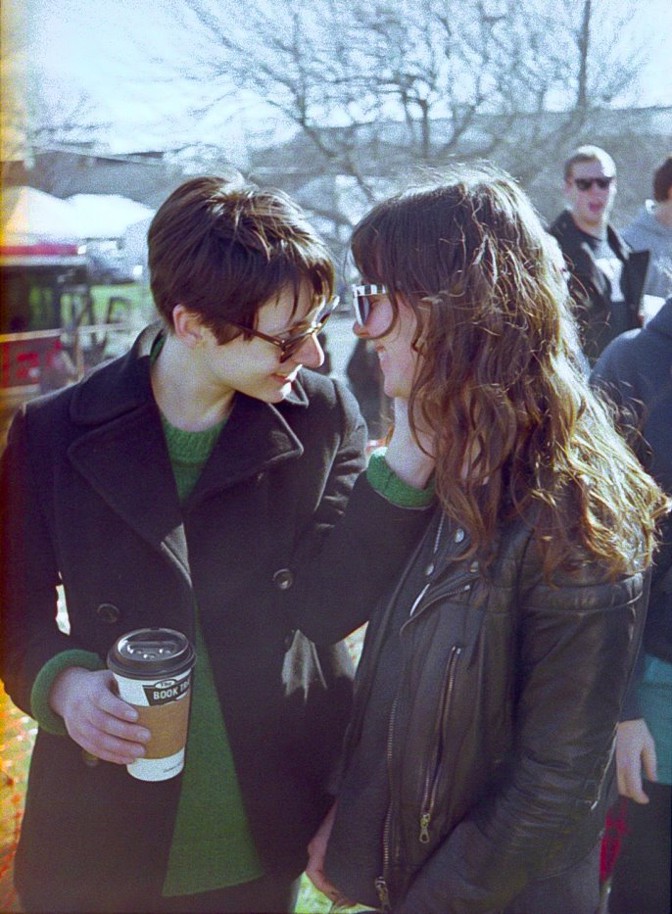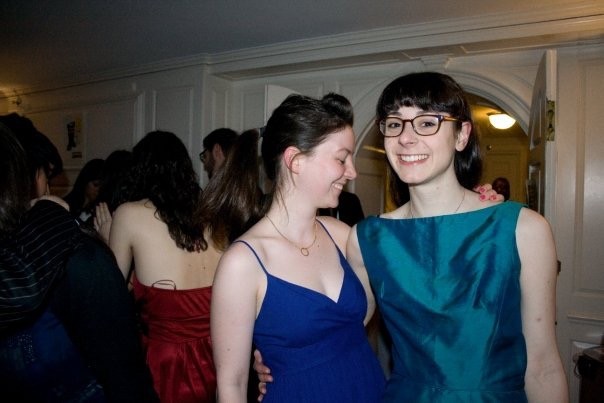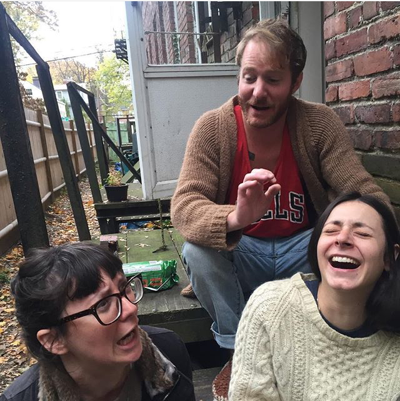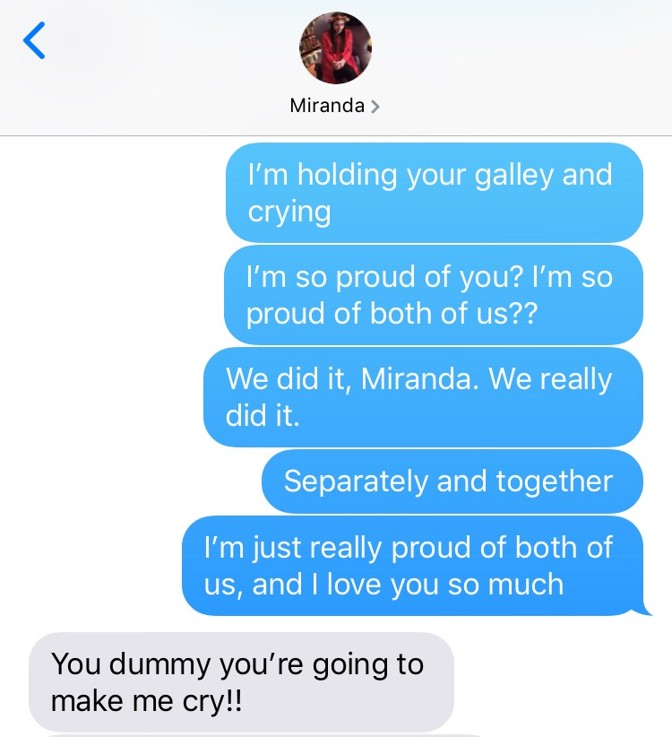Every week, The Friendship Files features a conversation between The Atlantic’s Julie Beck and two or more friends, exploring the history and significance of their relationship.
This week she talks with two best friends who met in college and are now both novelists with books coming out in early 2020. They discuss how they consider their friendship to be more on the level of a partnership, how scary it is to give honest feedback on your friend’s book, and how they’re sometimes jealous of and happy for each other at the same time.
The Friends:
Miranda Popkey, 32, a writer and social worker who lives in Watertown, Massachusetts. She is the author of the forthcoming novel Topics of Conversation.
Zan Romanoff, 32, a writer who lives in Los Angeles. She is the author of A Song to Take the World Apart, Grace and the Fever, and the forthcoming Look.
This interview has been edited and condensed for clarity.
Julie Beck: How did you two meet?
Miranda Popkey: We were on the same floor of the same dorm in college. We both went to Yale. It was so early in orientation that our parents were still there. We were sitting in our dining hall, and Zan got up to make herself some tea. I’d already identified Zan as someone cooler than me who I definitely wanted to know. I creepily also got up and wandered over. There were two hot-water dispensers, and Zan was fruitlessly trying to use the wrong one. She just couldn’t get any hot water in the teacup.
Zan Romanoff: It was a complicated thing.
Miranda: I helped her with her tea. It was like a meet-cute. Later, I also set up her printer. It worked for two weeks, maybe.

Zan: Long enough for her to cement herself in our friendship. Like, “Oh Zan, you’re going to need some help.”
Miranda: When I met Zan, she had never lit her own cigarette or opened a beer or wine bottle for herself because there’d always been a boy around who was trying to make out with her who was doing those things. I just slid right into that role.
Zan: For the record, I can now do all those things.
Miranda: To give another, slightly less flattering picture of me in those first few weeks of college, I think our friendship was further cemented when I—extremely dramatically, while wearing a strapless, backless velvet dress—broke up with my high-school boyfriend over the phone. And then proceeded to drink a lot of cheap vodka. That was also two weeks in, because traditionally that is when you break up with your high-school boyfriend.
Zan: I think of the major turning point in our friendship as being when [another guy] broke up with you sophomore year and you slept on my floor for two nights in a row. So many stories about boys.
Miranda: Real gross.
Beck: What initially drew you together, and what’s kept you together since? Are they the same things?
Zan: There was a little bit of drama in our female friend group at the beginning of freshman year, in the way that teenagers have drama. Some girls we knew had problems with Miranda, which was dumb, and all those girls are friends with her now. But our guy friends were like, “Miranda’s so cool. Miranda’s so smart.” I remember thinking, Clearly there’s something going on with this girl—she’s very polarizing. Those same girls had a problem with me, and Miranda stuck around for me at a time when basically no one else did. There’s a really strong sense of loyalty that we both have. If you’re one of my people, I’m going to stick with you. That’s one of the things that brought us together when we were younger and has definitely kept our friendship going over all these years.

Miranda: In terms of what drew me to Zan: My world when I came to college was very small and Zan was someone whose world seemed, incorrectly, a lot bigger.
The only thing I did in high school, basically, was study. I wanted to get out of California; I wanted to go to the fanciest school possible. I didn’t really listen to music. I was pretty sheltered. When I was growing up, we did not have a lot of money. I got to Yale and met people who had been having all these experiences I hadn’t had access to, and I was horribly insecure about that. Zan’s going to laugh, but Zan seemed like a person who was at ease being herself in the world. She was beautiful and brilliant and had amazing taste in books, music, and movies. I was just like, I want to know this person, and I want to be this person.
Zan: That’s hilarious. What I would later do to your taste ... A couple of years ago, I got Miranda very into One Direction. Joke’s on you.
Miranda: I think the reason there was drama in our friend group is that I was just so bad at hiding how anxious, vulnerable, and insecure I was. It’s really terrifying to be confronted with a physical manifestation of your own insecurities in the form of someone who cannot hide them. Zan didn’t hold that against me. Other girls did. [For example,] I remember consciously trying to dress more like Zan and other girls we knew. This is so creepy that I remember this, but you had that gray American Apparel tank dress that you wore, and I was like, Okay, this is what I’m supposed to wear now. I thought I was being more subtle than I was. I think there was a sense that I was Single White Female–ing a whole group of people.
Zan: I think they just assigned a malicious intent to [Miranda’s behavior] that wasn’t actually there. The only difference is that I looked at that and just thought, I think she’s insecure.
Several pivotal moments in our friendship were when other people wrote us off [or were annoyed], but I looked at Miranda, or Miranda looked at me, like, I bet this person’s really unhappy, and if I could help them feel better, they would stop behaving this way. By midway through our sophomore year, we became quite cemented as a pair. It was Zan-and-Miranda, all one word.
By the time we graduated, we were best friends. I always feel weird about that appellation. There’s something a little childish about it. But it is also true that I have many close friends and my relationship with Miranda is a different thing.
Beck: There are not a lot of ways to talk about shades of friendship. Obviously friends play different roles in people’s lives, but we don’t have a very nuanced language for it.

Zan: Because we’re very corny, we sometimes use the Grey’s Anatomy [quote], "You’re my person.” I also sometimes say partner-friend. In certain ways, it has more in common with a partnership. At Mir’s wedding, her husband’s two siblings and his best friend all came to the city-hall wedding, and then I was the one for Mir. I was the person on her side of the aisle. I mean, there was no aisle.
Miranda: There was just a woman in a conference room wearing a pair of slacks who had a really broad Boston accent. We were married by an extra from a Ben Affleck movie who had just wandered off set.
Zan: There are real expectations in this partnership. Like, you pick up the phone when this person calls. I think the reason for that, which was always understood, is that we became friends when we were both dealing with untreated depression and anxiety. We didn’t have therapists to call; we didn’t even really have language for what was happening to us. All we knew was that we had feelings we didn’t know how to deal with, and that the people around us often didn’t know how to deal with. So finding someone who got that was huge.
Miranda: Our friendship is, for me at least, a kind of ongoing conversation that we pick up and drop and pick up over and over again. It doesn’t ever end; it only pauses.
Zan: We never stopped being each other’s first call. When I sold my first book, I called my mom, I called my dad, and I called Miranda.
Beck: Was writing, and novel writing specifically, always the plan for both of you, and has it always been part of your friendship?
Miranda: We both write nonfiction and fiction. I tried to avoid being a writer for a really long time. I taught for a year, I worked in publishing for almost five years, and when I finally went to grad school to get my M.F.A., it was almost an admission of defeat. Whereas writing was a bigger and more constant part of Zan’s life that she didn’t try to run away from.
It can be hard to be really close to someone who’s trying to do the same thing that you do. It helped that I got to be completely 100 percent unreservedly thrilled for Zan when she was first starting because I wasn’t trying to do the same thing. I wasn’t even feeling tempted to compare us in that way. It felt like I just got to be on her team without any of my own bullshit getting in the way.
Now I think it helps that Zan has a pretty specific beat. She’s a cultural critic, and I write more about books. Zan’s first four books are young adult, [while mine is for adults]. We are doing slightly different things.
Zan: It’s funny to hear your version of it. In my mind, it was always like, Miranda’s the ambitious one. Miranda’s going to be successful.
Beck: What is your philosophy on sharing writing with friends while you’re working on it?
Miranda: I sent Zan a draft of my novel in a pretty early stage.
Zan: Miranda’s novel is a novel in stories. She sent them and said, “I think I actually wrote something good.” Then, of course—this is very Miranda—that was followed 24 hours later by, like, “Don’t read them. They’re garbage. Never mind.”
Miranda: I’m the kind of person who’s like, If I send someone I care about a piece of writing that is bad, they will realize that all of my writing is bad, and they will become very embarrassed to be friends with me and never contact me again.
Zan: I do remember reading it in a terrified fugue state because I was like, I can’t lie to her about this. She means too much to me; this means too much to both of us. If I think there are problems with this, I have to tell her. And I really didn’t want to. And then I loved it unreservedly, but it was scary.
Beck: I think there’s this idea in the culture that what friends are supposed to be, above all, is supportive. The question of when to support and when to challenge is a tough one.
Zan: We definitely fall on the challenge side of things.
Miranda: Most of the fights that we’ve had have fundamentally started with, “I think that this choice you’re making is hurting you.” Our most recent big fight was about a guy Zan was seeing. My concern about that relationship boiled down to “You’re behaving like a version of yourself I think you don’t actually want to be because you think that is a more appealing version to him.” That made me really sad and worried.
Zan: You’re introducing someone to your brand-new boyfriend, and I think in a lot of friendships you’d be expected to be like, “Oh my God, he’s so cute. I’m so happy for you.” I was shocked that she was like, “I don’t think I like him.” But that’s probably why we’ve stayed friends for so long. I really trust that she’s telling me the truth, and I respect that. Then there’s real power when you say, “I like this guy” or “I like your book.” I’m not bullshitting you.
Mir just read the first draft of my fourth book and was like, “This has problems,” which she was 100 percent right about. By the way, the new draft is so much better, and I sort of want to make you read it again.

Miranda: Please, definitely send it to me.
Beck: You have books coming out three months apart next year. Your industry is one where the work is public, and success is very public and measured in some ways by attention. Do you ever feel your friendship is strained by that, and how do you help each other with that aspect of your careers?
Zan: Even when I’m jealous of something that Miranda has accomplished, it’s never that I don’t want her to have it. She tends to work in genres that are taken a little more seriously than a lot of the stuff that I do. I’m frustrated by that, and there are moments where I’m like, Why can’t I write about things that everyone agrees are smart? But I don’t want to do those things any more than she wants to write about the Kardashians. As similar as we are, as much as we love each other, we’re different people, and we’re on different paths.
Miranda: There were moments when Zan was publishing her first and second books and I was in my M.F.A. program when I felt like I was so far from where I wanted to be, and I was like, Why can’t I be further along? The answer is because I started later and because she’s put in a whole lot of really hard work.
It’s been really reassuring and helpful for me to have someone so close to me who has gone through this frankly bonkers process of publishing your first novel and trying to figure out how to market it and market yourself.
Zan: Also, on [social media], you’re comparing your own experience of your life to someone else’s highlight reel. It’s never like that with us. Miranda watched me absolutely sob my way through the querying process, and through the book being on submission with editors. There’s no illusion in our friendship that anything happens effortlessly.
We have a very open dialogue about jealousy, success, and how petty we are. I could give you a list of Miranda’s five least favorite people on the internet and what she doesn’t like about all of them. I’m sure she could do the same for me. It’s very freeing because there’s no pretense that we’re above all that stuff. It’s really hard—we’re trying the best we can to not give in to our worst impulses, and we usually fail, but that’s fine. We still love each other.
Beck: Miranda, much of your book is in the form of conversations with friends, which is also what we’re doing right now, so that’s nice and meta. Do you feel that something about having a conversation with a friend clarifies ideas for you?
Miranda: Absolutely. I’m definitely a person who writes through things to understand them, but before I can get to that step, I often need to have a conversation with someone. Having your ideas come back to you in a conversation and getting to mirror the other person’s ideas—hopefully, you’re building something together. That’s so intensely pleasurable to me. Zan is the person I would most want to do that with on basically any subject. We’re really good at talking to each other.
Zan: That’s true. As evidenced by the length of this phone call.
If you or someone you know should be featured on The Friendship Files, get in touch at friendshipfiles@theatlantic.com and tell us a bit about what makes the friendship unique.

No comments:
Post a Comment